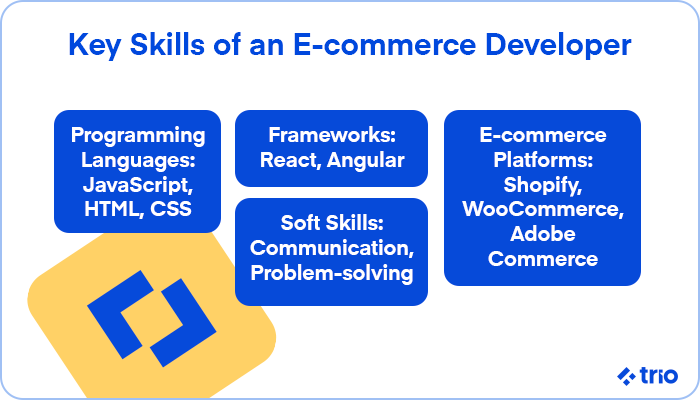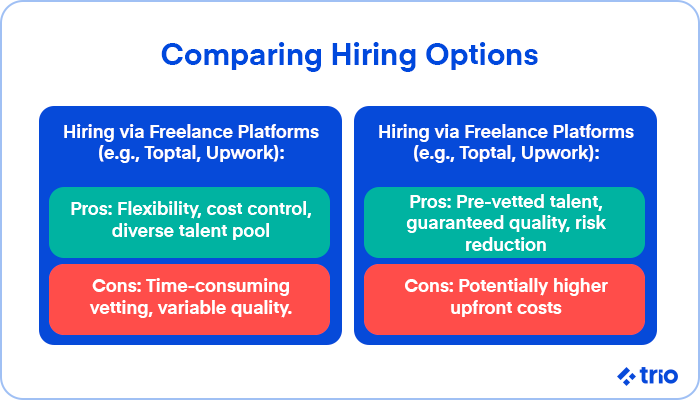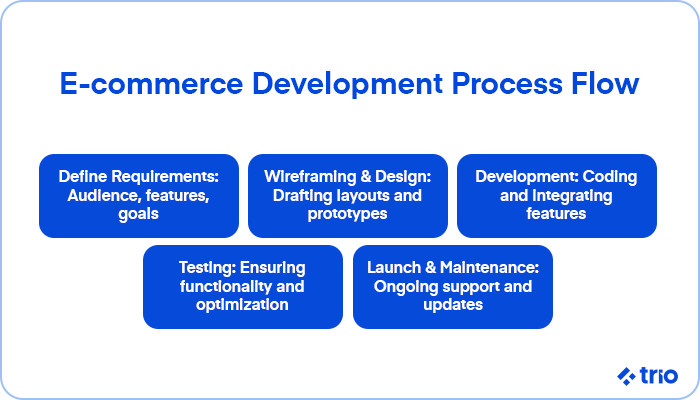Hiring the right e-commerce (or eCommerce) developer is crucial for building a high-performing online store, especially with how important web design has become in today’s over-saturated digital marketplace.
Whether you’re a startup or an individual creating a small shop for handmade goods or scaling up a global retail business, finding an experienced e-commerce developer can determine your platform’s success.
If you need to find and hire an eCommerce developer or even put together an entire development team, you’re in the right place.
At Trio, we’ve had many years of experience connecting clients with skilled developers for their product development. Our focus on developer well-being means that we’ve been able to retain the top developer talent in the industry.
When you’re looking to hire someone through Trio for cost-effective software development, you can rest easy knowing that you’re hiring the best developers in terms of technical skills, but also developers adept in soft skills.
But, before you start, let’s go through everything you’ll need to hire top talent. We’ll make sure you can identify what to look for in a developer, understand the costs, and go over best practices to ensure a seamless development process.

What Should You Look for When Hiring an Ecommerce Developer?
Essential Skills and Qualifications of an E-commerce Developer
A skilled e-commerce developer needs a combination of technical expertise and practical experience.
It’s important that they have all the basic skills that you might expect of a front-end-developer and sometimes even of a back-end developer if you want them to take care of the full tech stack.
That means they should be fluent in relevant programming languages like JavaScript, HTML, and CSS. They should have experience with frameworks such as React or Angular, and have any other technical skills you’d expect of a full-stack developer.
This technical foundation enables them to build responsive, functional, and visually appealing websites that perform well across devices.
Equally important is their familiarity with e-commerce platforms like Shopify, WooCommerce, or Adobe Commerce (previously known as Magento.)
Developers and software engineers who specialize in web development with these eCommerce platforms can, firstly, advise you on which of these would be the most suitable for your business requirements.
They can then leverage built-in features to customize solutions for your business so that they don’t have to build everything from scratch, saving you both time and money while still giving you the best solution possible.
Beyond technical skills, you will need a developer with experience in SEO best practices.
Although SEO is not part of the basic software developer job description, it is incredibly important for eCommerce projects as it ensures that your website ranks well on search engines, driving organic traffic and boosting visibility.
You also need to look for someone who understands the importance of seamless user experience (UX) and user interface (UI) design. For example, functionality in online sales systems is useless if people find them difficult to use.
Ease of use will also help your reviews, allowing you to rank higher in search and app stores.
A developer or eCommerce designer adept at creating intuitive navigation, fast-loading pages, and mobile-friendly layouts will ensure your customers have an enjoyable shopping experience.
How to Assess a Developer’s Portfolio for E-commerce Projects
When you put out a job listing or start searching, you’ll need to figure out which applicants you want to hire.
When reviewing a developer’s portfolio, look beyond aesthetics to evaluate the functionality and usability of their past projects.
You should be looking at everything from the basics that we have mentioned above, to more unique skills that will apply to your specific situation.
This may be difficult if you have no technical knowledge of your own, in which case, going with a company like Trio may be your best option.
We’ll be able to find the right developer on your behalf. You’ll know they have the right skills for your custom software development, but they’ll also be experienced developers with a track record of success.
However, even if you don’t have a technical background, there are some things you can look at on your own.
Try to browse live versions of the websites they’ve worked on to test their responsiveness on different devices. Are the designs modern and consistent with current trends? Do the sites load quickly, and is the navigation intuitive?
Portfolios also reveal a developer’s ability to tailor solutions to various industries. Make sure that they are at least somewhat familiar with the specific eCommerce solutions and store setup that you are going to need.
For instance, a fashion retailer may require a different approach than a business selling electronics.
Positive client testimonials or case studies are invaluable when you hire e-commerce developers as they provide insights into the developer’s communication, problem-solving skills, and ability to meet deadlines.
Don’t be afraid to reach out to these previous clients. If the developer does not provide the information in the portfolio, ask them for it.
Understanding the Developer’s Experience with E-commerce Platforms
The right platform for your store depends on your goals, and the developer’s expertise with that platform is incredibly important, as we have briefly mentioned above.
While there are many similarities between the different platforms out there, there are also many differences. This means that familiarity with the software is key to swiftly launching solutions to enable functionality in online sales.
For example, Shopify is ideal for businesses seeking simplicity, while Adobe Commerce suits those requiring complex customizations.
Ensure the developer has in-depth experience with the platform you’ve chosen and can implement third-party integrations such as payment gateways, analytics tools, and CRM systems that you are already using if you’re focusing on maintenance.
Their ability to offer customization options also matters, alongside their ability to use the existing templates.
Off-the-shelf solutions may not meet your unique requirements, so skilled eCommerce developers with coding expertise can create tailored features to differentiate your store from competitors or meet business regulations.
Where to Find the Best Freelance E-commerce Developers?
Top Job Boards to Hire Ecommerce Developers
Before you can hire eCommerce developers, you need to find them.
This begins with exploring reliable platforms that a freelance developer might frequent.
Websites like Toptal focus on connecting businesses with top-tier talent, offering a curated pool of pre-screened developers. They pride themselves on only offering highly skilled developers who have proven themselves.
As it is rather difficult for developers to get onto Toptal, you assume that they will provide you with a list of the top eCommerce talent.
Upwork, on the other hand, provides access to a wide range of freelancers, allowing you to filter by skills, rates, and experience. This might be a better option for you if you are just starting out and don’t have as much liquidity or have a simple project.
Developers for Hire is another excellent resource featuring detailed profiles and reviews to simplify your selection process.
Each platform has its strengths, so choose based on your specific needs so that you are more likely to find the right fit.
If you prioritize quality over quantity, platforms with rigorous vetting processes, like Toptal, are ideal for finding a freelancer. If flexibility and budget constraints are more important, marketplaces like Upwork might be a better fit.
The important thing that you need to take into account is that, even if you know where to look, you will still need to vet the developers on your own. This can be an extremely time-consuming process, and it is quite risky.
If you go through an agency like Trio, with many years of experience and a personal relationship with each of our developers, you eliminate a lot of this risk.
Furthermore, our considerations of things like effective client communication and team culture alignment increase your changes of successful collaborative software development.

Utilizing Social Media to Connect with E-commerce Web Developers
We have found that social media can be a powerful tool for discovering talented developers.
Platforms like LinkedIn allow you to search for professionals by skills and location, while GitHub showcases their coding projects. We recommend that you check out a developer’s GitHub profile even if you’ve connected through other means.
X, formerly called Twitter, can also help you engage with developers who share their expertise through posts and discussions.
Networking through these platforms enables you to evaluate a developer’s knowledge and industry presence before initiating formal discussions. It can also give you a good idea of their communication skills and sometimes even character.
Joining e-commerce development groups on Discord, LinkedIn, or Slack can also provide valuable referrals and insights. However, we’ve found these can be a little overwhelming if you don’t have technical knowledge yourself.
Networking Strategies for Finding Developers for Hire
Word-of-mouth recommendations are one of the best ways to find freelance e-commerce developers for hire. However, these recommendations are difficult to find if you are not open about looking for dedicated developers with peers.
Attending industry events or e-commerce meetups can connect you with professionals who understand your business goals. They will be able to connect you with a freelance web developer with the right skills for your project.
Professional associations and online communities dedicated to e-commerce development are also great places to network and gather leads. But, once again, we have noticed that going through these communities requires a lot of vetting.
How Much Does It Cost to Hire Ecommerce Developers?
Understanding the Pricing Models for E-commerce Development
Developers typically operate under one of three pricing models: hourly rates, fixed-price contracts, or retainers.
Hourly rates are common for freelancers and vary depending on expertise and location. They are as simple as the name indicates. You agree on the rate and then pay in predecided increments as the developer works.
You can limit the amount of time they spend in a given week or month to suit your budget.
Fixed-price contracts are ideal for projects with a clear scope, while retainer agreements work well for ongoing needs. Usually, this is the type of pricing model we see in outsourcing.
You figure out all the details of your project and pay once, and that is it. As long as nothing changes in terms of the project scope or timeline, it’s up to the outsourcing firm to handle any mishaps.
Retainers can vary and are not something that we’ve seen very often here at Trio. However, some developers may ask for a retainer when maintaining a website long-term and committing to being on hand to deal with any issues.
Understanding these models helps you align your budget with your project requirements.
While hourly rates provide flexibility, fixed prices offer predictability, making them suitable for businesses new to e-commerce.
Factors Influencing the Cost of Hiring a Developer
We’ve observed that there are several factors that influence how much you’ll pay for a developer.
Their experience level is one of the most significant determinants. Senior developers charge more but bring a wealth of knowledge to complex projects. They are also able to code more efficiently, which may make them the most cost-effective hourly option.
The complexity of your store also matters; features like custom designs, integrations, or multilingual support increase costs. If you are using templates, it will be a lot quicker and easier, affecting cost.
Lastly, geographical location plays a role. If you are hiring remotely, then the location of the developers gives you more freedom, with developers in regions like North America often commanding higher rates than those in Latin American countries.
Budgeting Tips for E-commerce Development Projects
To manage costs effectively, we recommend that you start by defining your project requirements in detail. In fact, if you go through us at Trio, we will insist on it and even help you do it.
Clear specifications prevent ‘scope creep’ and help you obtain accurate quotes.
We also suggest that you think beyond the initial product. Consider long-term expenses, such as maintenance and updates, when planning your budget.
It’s always a good idea to allocate a contingency fund for unexpected changes. This can also save you from financial surprises.
What Are the Best Practices for E-commerce Development?
Key Features Every E-commerce Site Should Have
Every successful e-commerce site needs intuitive navigation, fast loading speeds, and mobile optimization.
If you aren’t familiar with web or mobile development, we recommend that you think of your own experience. What frustrates you? Probably slow loading times or when you can’t figure out where to access a feature.
What about when you access a site on your computer and then try again on your phone later, only to find that things just don’t work right?
Clear product descriptions and high-quality images are also a must to enhance user experience.
Features like secure payment options and customer reviews build trust. As more people become aware of the dangers of online shopping, such as the variety of scams out there, trust is becoming incredibly important and should be your focus.

Importance of Optimization in E-commerce Websites
Optimizing your eCommerce website ensures it performs well under different conditions.
From implementing SEO strategies for better search engine visibility to fine-tuning page speed and creating mobile-friendly designs, optimization can help you meet customer expectations and drive sales.
Developer experience is invaluable here, as developers with several years under their belt will know about optimization factors that junior developers might not be aware off
Customization Options for Your E-commerce Platform
While standard templates can work for you if you have a smaller business, we’ve seen first-hand how customizing your platform allows you to cater to unique customer needs.
Custom features, from personalized product recommendations powered by AI and machine learning to advanced search capabilities, can set your store apart and improve conversions.
Depending on the platform that you are using, you might need to hire a front-end developer to build the components you want.
How to Ensure a Seamless Development Process?
Communicating Your Business Needs to Your Developer
Clear communication is essential for any team, and it’s no different for developers.
You need to begin by providing a detailed project brief outlining your goals, audience and desired features. This will help developers understand the bigger picture and will help team leads make decisions to benefit your business.
Then, you need to establish a way for your developers to reach out and tell them what you expect in terms of updates.
Open channels of communication allow the web developer to ask questions and clarify requirements, minimizing misunderstandings.
Setting Milestones for a Successful E-commerce Project
Breaking your project into milestones ensures steady progress and helps you realize when there might be a delay or pick up on any issues in a timely manner.
Each phase – from wireframing to design, development, and testing – should have specific deliverables.
This approach not only keeps the developer on track but also allows you to provide timely feedback so that they can make small changes rather than having to redesign the entire end product.
Reviewing Progress and Providing Feedback Effectively
As we’ve mentioned above, regular progress reviews help you address issues early. You can do these at the end of every milestone, or you can do them on a weekly basis.
We’ve found that daily is far too often, and monthly might be too long, depending on your project, but it’s important to evaluate your situation and what will work for you.
Use these opportunities to provide constructive feedback, ensuring the final product aligns with your vision.
What Are the Latest Trends in E-commerce Development for 2024?
Emerging Technologies in E-commerce Development
The rise of AI-powered chatbots, voice search optimization, and blockchain for secure transactions are reshaping e-commerce.
Staying ahead of these trends is a necessity.
We’ve noticed a particularly large uptick in the use of these tools to facilitate international payments and improve accessibility, respectively. Chatbots are not limited by language barriers.
This means that, if used correctly, you could be opening up your business to more people from all over the world. You need to be prepared for the associated challenges these technological advancements will bring.
Mobile App Integration for Enhanced User Experience
With mobile shopping on the rise, integrating a dedicated app or ensuring seamless mobile functionality is becoming essential.
Just think about your own internet use. Most of it is on your computer or on your phone. For most people, it will be the latter. So, if you do not emphasize mobile app integration, you’ll lose out on a lot of business.
Features like push notifications and one-click checkouts improve customer retention and convenience. However, general app speed and usability should be your primary focus.
Adapting to Consumer Behavior Changes in the E-commerce Space
Consumer expectations are evolving, with more demand for sustainable products and transparent practices.
Aligning your e-commerce strategy with these preferences can build loyalty and trust. Many developers are becoming familiar with sustainable software development practices, so it might be worthwhile asking about them before you hire the developer.
If you are interested in a developer at the forefront of the web development industry, specifically e-commerce, reach out to us here at Trio.
Instead of providing you with a cookie-cutter solution, we evaluate your individual project and requirements and connect you with a developer who can give you what you want for the best value.
We can also help you keep that same developer, or team of developers, for long-term maintenance so that you know you can have someone who knows your product and doesn’t have to familiarise themselves before they can fix it.







